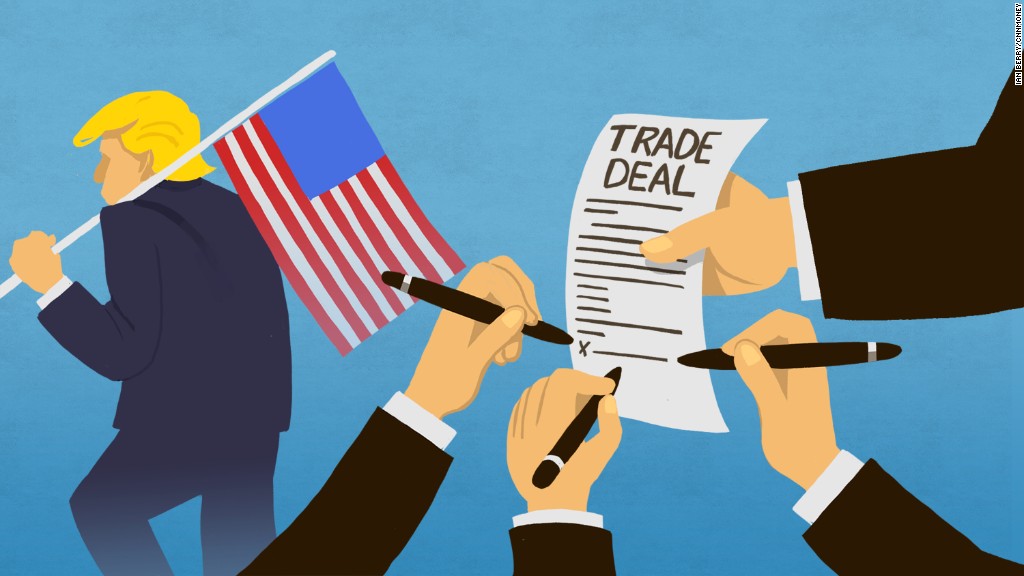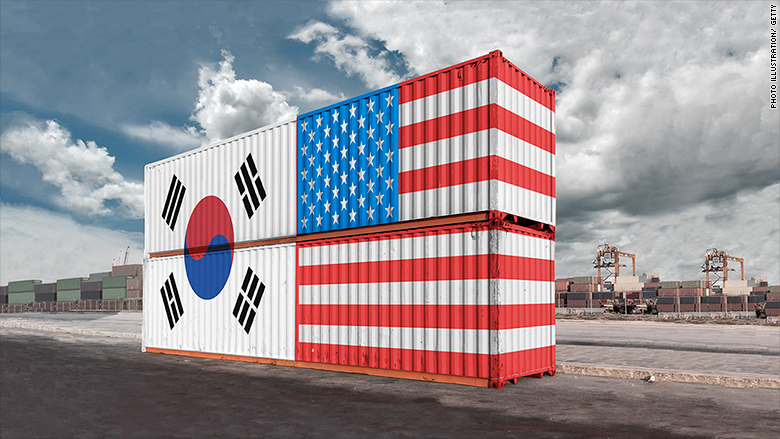
The U.S. and South Korea are heading for a showdown over trade.
Officials will meet in Washington this week to start talks aimed at renegotiating Korus, the free trade agreement that has linked the two economies for nearly six years.
President Trump has been hugely critical of the deal, slamming it during his campaign as "horrible" and a "job killer." Since taking office, he has threatened to yank the U.S. out of it altogether.
The talks over its future could have major implications for how other countries approach trade negotiations with Trump -- and for the tense situation over North Korea.
Related: Trump's trade flashpoints in Asia
What are the negotiations about?
Korus was inked back in 2007, but didn't come into force until five years later.
It eliminated tariffs and other barriers to trading in things like agricultural products, cars and industrial goods.
Trade in goods and services between the two countries has soared since. In 2016, it hit nearly $150 billion. South Korea is now the sixth biggest U.S. trading partner.
South Korea hasn't been keen to renegotiate Korus, but it bowed to U.S. pressure to do so late last year.
Related: Trump's top trade issues: Where they stand

What's at stake?
For Trump, overhauling trade deals that he says are unfair to the U.S. means fulfilling a big campaign pledge.
But Troy Stangarone, a senior director at the Korea Economic Institute of America, a Washington-based think tank, says Trump's criticism of the South Korean deal is misguided.
Related: New Pacific trade deal could leave U.S. playing catchup
He points out that under Korus, the U.S. has seen substantial growth in the value of services it sells to South Korea.
And after ballooning in the early years of the deal, the overall U.S. trade deficit with South Korea is now in decline, according to another Korea Economic Institute director, Phil Eskeland.
In any case, U.S. withdrawal from Korus looks unlikely. It would hurt beef farmers, who are big exporters to South Korea.
What's going to be the focus for Trump?
Automobiles make up a huge part of the U.S. trade deficit with South Korea, so they are "likely to be a major focus point," said Krystal Tan, an economist at research firm Capital Economics.
She predicts the U.S. may try to get South Korea to relax stringent emissions standards and push for more U.S.-made parts to be used in South Korean vehicles that are exported to the U.S..
Related: U.S. trade deficit with Mexico and China is growing
But some observers aren't convinced autos alone will make much of a dent in the trade deficit, which Trump views as the gauge of economic relations between two countries.
At about one tenth the size of the U.S. auto market, South Korea is simply too small to absorb enough U.S.-made vehicles to make a big difference, Stangarone said.
Instead, the U.S. might have to focus on services. For example, changing rules that would make it easier for American companies in legal and digital businesses to operate in South Korea.
What does it mean for other U.S. trade partners?
Countries around the world will be watching the talks with South Korea very closely to see how Trump and his team tackle one-to-one negotiations.
Japan, which also runs a big trade surplus with the U.S., appears reluctant to engage in talks with the Trump administration on a bilateral free trade deal.
Related: Trump and China: 2018 could get nasty
Stangarone said that Trump needs to show during the South Korea talks that these sorts of negotiations can be good for U.S. trade partners, too, which will mean making concessions.
"If the talks are too one-sided, it will discourage other countries," he said.
The South Korea deal isn't the only one in Trump's sights. His administration is already renegotiating NAFTA, the 24-year old agreement between the U.S., Canada and Mexico.
What about North Korea?
The trade talks come at a delicate time on the Korean peninsula.
Tensions between the U.S. and North Korea spiked last year as Kim Jong Un's regime pushed ahead with its nuclear weapons program.
Related: Will sanctions kill North Korea's quiet consumer revolution
A disagreement between the U.S. and South Korea over trade could strain ties between the two key allies. That could prompt other U.S. partners, like Japan, to question U.S. commitment to security in the region.
"Bilateral cooperation is paramount," Stangarone said. "The U.S. and South Korea cannot afford for the talks over the [trade deal] to deteriorate and tensions to spread."


